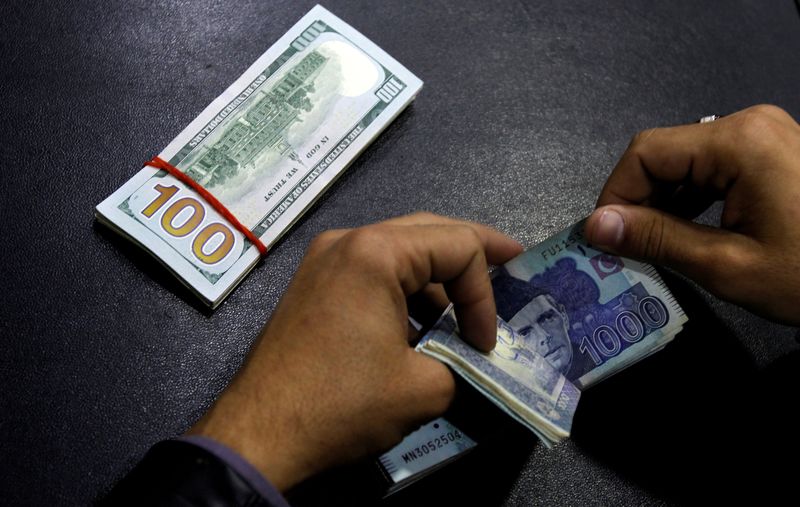By Syed Raza Hassan
KARACHI, Pakistan (Reuters) - Pakistan's finance minister on Wednesday blamed the rupee's slide on political turmoil, saying he expects market jitters over the currency's sharp decline to subside soon.
The South Asian country recently passed through another bout of political instability, with the government of Prime Minister Shehbaz Sharif taking over from ousted premier Imran Khan in April.
"The rupee downturn is not due to economic fundamentals," Finance Minister Miftah Ismail told Reuters. "The panic is primarily due to political turmoil, which will subside in a few days."
Pakistan is also suffering from fast depleting foreign reserves, a declining currency and widening fiscal and current account deficits, with the rupee losing 18% of its value since Dec. 21.
The rupee fell 2% on Monday and 3% on Tuesday despite last week's staff level agreement reached with the International Monetary Fund that would pave the way for a disbursement of $1.17 billion under resumed payments of a bailout package.
On Wednesday morning, the rupee was trading at 225 per dollar, having ended Tuesday at 221.99 after Fitch ratings agency revised its outlook for Pakistan sovereign debt from stable to negative - though it affirmed Long-Term Foreign-Currency and Issuer Default Rating at "B-".
"There is panic in the market, I fear it (the rupee) will go down further," Zafar Paracha, secretary general of a foreign exchange association, the Exchange Companies of Pakistan, told Reuters.
Paracha said he did not see any reason for the depreciation in the rupee other than possible IMF pre-conditions.
Neither the government nor the IMF have said anything about the need for any further depreciation of the currency, though Pakistan recently adopted a market-based exchange rate under advice from the IMF under the economic reforms agenda.
Ismail said imports, which put pressure on the rupee, have been curbed and the current account deficit has been contained in the first 18 days of the new fiscal year this month, and pressure on the rupee would ease moving forward.
He told a news conference that the IMF believed a $4 billion funding gap still existed and this would be bridged by various friendly countries that he declined to identify.
One of them, he said, had offered $1.2 billion in financing for oil purchases that would be finalised soon. Another had pledged to invest $1 billion in the Pakistan Stock Exchange (PSX) and while third had promised $200-$300 million in gas on deferred payments.
A fourth country had offered 2 billion in SDR (special drawing rights) deposits, Ismail said.
Reserves have fallen to as low as $9.8 billion, hardly enough to pay for 45 days of imports.
“Over the last three months we tried to curtail imports, we had some success and some failures...With the ban on imports of foreign-assembled cars and cell phones, we have benefited,” Ismail told reporters.
"We have asked for State Bank of Pakistan permission for letters of credits required for imports worth between $100,000 and $500,000, which the central bank generally does approve, but the process takes eight to 10 days," he said.
The measures taken so far had cut imports from some $7 billion in June to just $2.6 billion in the first 18 days of July, he said.

On Tuesday, sovereign dollar bonds issued by Pakistan suffered sharp losses to record lows after Fitch's move, while the Pakistan Stock Exchange's KSE100 Index .KSE fell 2.36%.
(This story corrects 2 billion in SDR's (removed $) in paragraph 13).